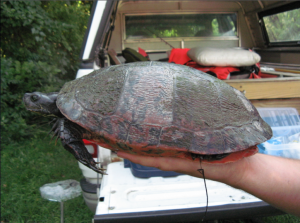Marcellus Shale Industry Lobbies For New Endangered Species Laws

Courtesy of the Pennsylvania Fish and Boat Commission
The red-bellied cooter is one of 88 endangered wildlife species in Pennsylvania.
Pennsylvania’s shale gas industry is throwing its support behind new proposed legislation that would change the way creatures are added to the state’s endangered species list.
The bill, sponsored by state Rep. Jeff Pyle (R-Armstrong) and backed by Republican leaders, could knock down regulatory hurdles for drillers, while throwing up new ones for the two state agencies that oversee designations to the list.
Pyle, whose district includes the mining and hydraulic fracturing industries, argues the current system is slowing down economic development – especially in the growing oil and gas industry.
“I can tell you we’ve had Marcellus developments which are bringing great wealth to our area,” Pyle told StateImpact in a phone interview. “It’s letting people keep their farms and those, you don’t know until you walk face first into it that you’re in a bat habitat or a protected area for spadefoot toads, rattlesnakes.”
In an Aug. 26 letter of support for the bill, heads of the Marcellus Shale Coalition, the Associated Petroleum Industries of Pennsylvania and the Pennsylvania Independent Oil & Gas Association wrote that the bill would “introduce consistency, transparency, and accountability to threatened and endangered species conservation while also allowing sustainable economic development across the Commonwealth.” (Read the full letter below.)
Right now, if a gas company wants to build a new drilling rig or construct a pipeline, the company has to go through a lengthy habitat review process to check for threats to rare or endangered wildlife in the area.
One part of Pyle’s bill would force the two state commissions that oversee the list – the Game Commission and the Fish and Boat Commission – to prove the presence of endangered species, rather than requiring gas companies to conduct their own field studies first. It will also create a “centralized database” for industry to access information about these habitats. That information is currently blocked by the state’s Right to Know law to prevent poachers from hunting threatened animals.

Scott Detrow / StateImpact Pennsylvania
As natural gas drilling expands in northeast Pennsylvania, well sites and pipeline routes are disturbing more and more timber rattlesnake habitats.
John Arway is head of the Pennsylvania Fish and Boat Commission. Arway said his agency has been criticized for how long the review process can take. “But the reality is, in the case of my commission, the anglers and boaters are paying for this service. The industry doesn’t pay for this service,” he said.
Kathryn Klaber, CEO of the Marcellus Shale Coalition, downplayed the industry’s role in pushing for the bill in an e-mailed statement, saying it would benefit “every industry that moves dirt – agriculture, home builders, municipal water authorities and utilities, manufacturing, road construction and energy development.”
Klaber praised the legislation for its transparency. But critics argue the bill will undermine the authority of the commissions by also giving the Independent Regulatory Review Commission and the state legislature more control over endangered species designations. The Pittsburgh-Post Gazette reported it could also force the commissions to lose $27 million in federal grants.
“When you say another independent board, it’s really putting it more into another beurocratic structure than it would be into a little more scientific structure,” said Rep. Steve McCarter (D-Montgomery).
Arway said the two commissions have been working on a new review system for the last five years, but they’ve run out of money to finish the project.
“Really, if industry wants an expedited process, they need to begin investing in this review tool that’ll help all of us.”
















